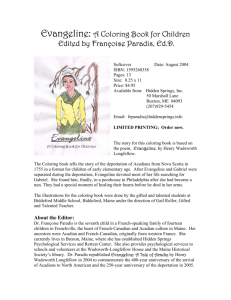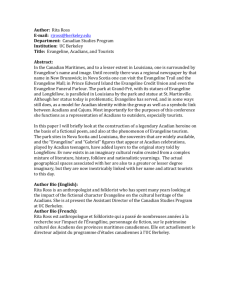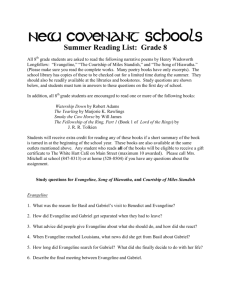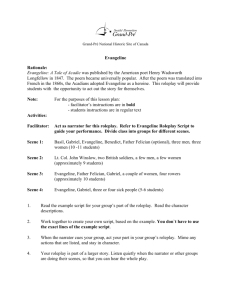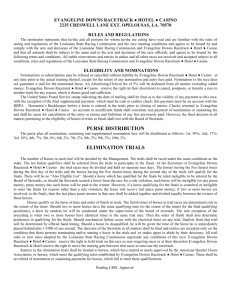The Story of Evangeline
advertisement
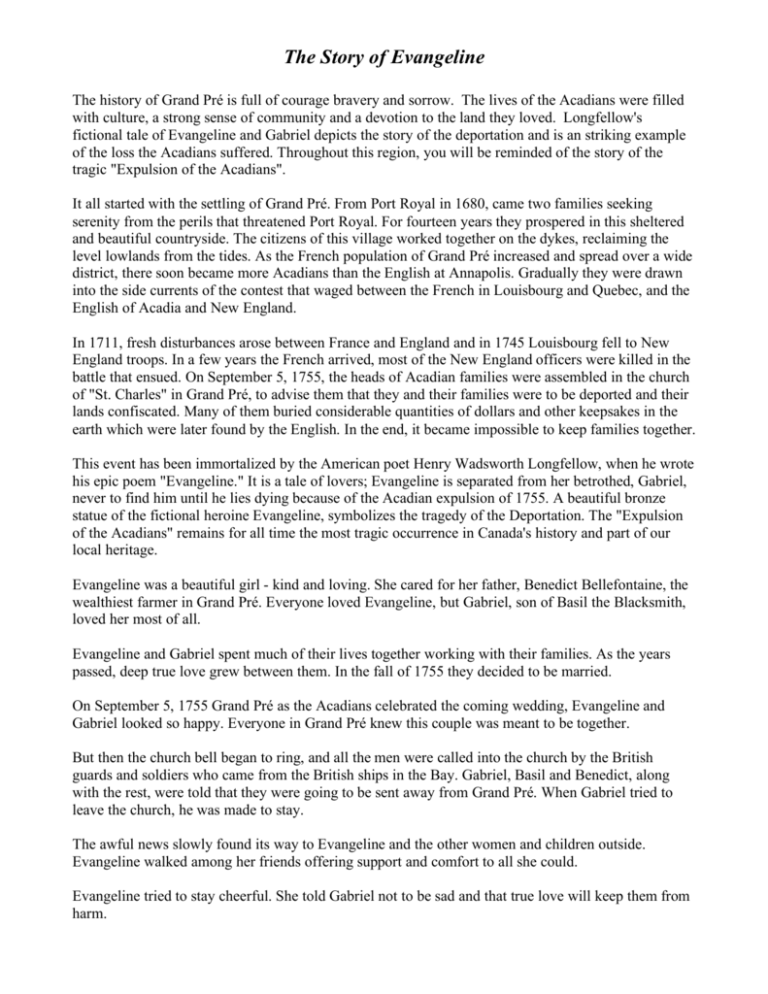
The Story of Evangeline The history of Grand Pré is full of courage bravery and sorrow. The lives of the Acadians were filled with culture, a strong sense of community and a devotion to the land they loved. Longfellow's fictional tale of Evangeline and Gabriel depicts the story of the deportation and is an striking example of the loss the Acadians suffered. Throughout this region, you will be reminded of the story of the tragic "Expulsion of the Acadians". It all started with the settling of Grand Pré. From Port Royal in 1680, came two families seeking serenity from the perils that threatened Port Royal. For fourteen years they prospered in this sheltered and beautiful countryside. The citizens of this village worked together on the dykes, reclaiming the level lowlands from the tides. As the French population of Grand Pré increased and spread over a wide district, there soon became more Acadians than the English at Annapolis. Gradually they were drawn into the side currents of the contest that waged between the French in Louisbourg and Quebec, and the English of Acadia and New England. In 1711, fresh disturbances arose between France and England and in 1745 Louisbourg fell to New England troops. In a few years the French arrived, most of the New England officers were killed in the battle that ensued. On September 5, 1755, the heads of Acadian families were assembled in the church of "St. Charles" in Grand Pré, to advise them that they and their families were to be deported and their lands confiscated. Many of them buried considerable quantities of dollars and other keepsakes in the earth which were later found by the English. In the end, it became impossible to keep families together. This event has been immortalized by the American poet Henry Wadsworth Longfellow, when he wrote his epic poem "Evangeline." It is a tale of lovers; Evangeline is separated from her betrothed, Gabriel, never to find him until he lies dying because of the Acadian expulsion of 1755. A beautiful bronze statue of the fictional heroine Evangeline, symbolizes the tragedy of the Deportation. The "Expulsion of the Acadians" remains for all time the most tragic occurrence in Canada's history and part of our local heritage. Evangeline was a beautiful girl - kind and loving. She cared for her father, Benedict Bellefontaine, the wealthiest farmer in Grand Pré. Everyone loved Evangeline, but Gabriel, son of Basil the Blacksmith, loved her most of all. Evangeline and Gabriel spent much of their lives together working with their families. As the years passed, deep true love grew between them. In the fall of 1755 they decided to be married. On September 5, 1755 Grand Pré as the Acadians celebrated the coming wedding, Evangeline and Gabriel looked so happy. Everyone in Grand Pré knew this couple was meant to be together. But then the church bell began to ring, and all the men were called into the church by the British guards and soldiers who came from the British ships in the Bay. Gabriel, Basil and Benedict, along with the rest, were told that they were going to be sent away from Grand Pré. When Gabriel tried to leave the church, he was made to stay. The awful news slowly found its way to Evangeline and the other women and children outside. Evangeline walked among her friends offering support and comfort to all she could. Evangeline tried to stay cheerful. She told Gabriel not to be sad and that true love will keep them from harm. Five days later, the Acadian people were indeed driven from their homes with only what they could carry. Some families were separated in the confusion of being loaded onto the boats including Gabriel and his father. Night came, Evangeline tried to comfort her father, while they waited to be loaded onto a ship. From the housetops and barn roofs, fire flashed and lit up the sky. When Benedict saw his farm burning, his whole life disappearing in the smoke and flames, it broke his heart and he died. In the morning, Evangeline and Father Felician buried him. At last, Evangeline was loaded onto a ship. The British ships took the Acadian people to many different places along the eastern coast of North America, left to start their lives again. Evangeline spent her life searching for Gabriel, praying to be together with him again. As the years passed, many people tried to tell Evangeline to give up her search but she would tell them and assure them that she will find him and that she will not stop searching. As the long sad years of her life passed, Evangeline was seen in tents of missions, in noisy camps and battlefields; in small villages and in big cites. She grew tired and old, when, in disappointment, she gave up her search. One Sunday morning, while climbing the stairs to those awaiting her kindness, Evangeline felt an unusual calmness come over her. On a bed near the top of the stairs, Evangeline saw an old man - long and thin, with grey curls around his face. It was her own sweet Gabriel's face! She ran to him and knelt beside him, tears of joy streaming down her cheeks. Gabriel could not speak or get up. Evangeline kissed him, and told him once more not to be sad, that true love has kept them from harm and that they are together now and always will be. She held him close to her as he died in her arms. She kissed him again, then bowed her head in thanks. She found her beloved Gabriel at last. Side by side, in their nameless graves, Evangeline and Gabriel lie sleeping - far from Grand Pré, but together forever. Credited to: Evangeline Trails Association website
